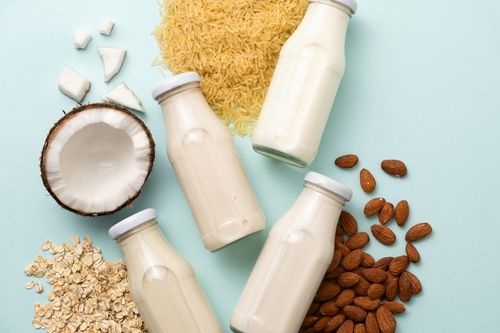
Almond Vs. Cow's Milk: A Nutritional Knockout
- Jan 9, 2025
Struggling to decide if you should fill your glass with cow’s milk or dive into the plant-based world with almond milk? Breathe easy! This is the milk manifesto you didn't know you needed, challenging everything you've been taught about the critical choice between these two dairy divas. Let's get ready to rumble!
First, let's take a look at the nutritional profiles of these two star players. Not all milks are created equal. Those seeking protein will find their fix in the 8.5 grams of protein per cup residing in cow's milk. A downgrade to just 1 gram awaits in almond milk, making it the skimpiest of skim milks in this regard. But remember, nutrition isn't only about protein – you heart health enthusiasts might lean towards the almond side as it comes with less artery-clogging saturated fats compared to the cow version.
Our duel goes deeper into the nitty-gritty world of carbs, sugars, and fibres. While moo milk hosts 12 grams of carbs per cup, primarily from lactose, almond milk puffs its chest out with an unimpressive 3.4 grams. However, this makes it the lower-carb contender! Sweetened versions of both these players take the carb and sugar count up a notch, so pay heed to hidden sugars, lest your milk of choice betrays you.
Pop quiz, hotshot: what's the one nutrient found in plants and not in animal products? The answer is fibre. Yes, fibre – the lifeblood of healthy digestion and heart. Almond milk triumphantly presents 0.5 grams per cup, leaving cow's milk lost and confused with a total fibre count of zero.
What's that you say about sugar content? Unsweetened almond milk enters the boxing ring with zero grams per cup, making it ideal for the sugar policers among us. Cow’s milk stands on shaky ground with around 12 grams per cup from naturally occurring lactose. Yet, our sugar story takes a dark twist with sweetened almond milk sometimes exceeding cow's milk in added sugars.
Both warriors in this dairy duel are calcium contenders. On the cow's side, you're looking at roughly 300 mg per cup, while almond milk fights back with just 482 mg. The catch? Most of this in almond milk comes from fortification rather than natural content. Beefed up with added nutrients like vitamin D, vitamin B12, and additional calcium, fortified almond milk is a formidable foe in the fight for bone health.
Valued reader, final judgements are personal and vary based on your life, palate, and nutritional needs. Both milks have their strengths and weaknesses, from protein and calcium content to sugar levels and dietary restrictions. Turn the labels around, read them carefully, and select the milk that suits your lifestyle the most. Just remember, too much of a good thing can quickly turn sour. Balance and moderation, comrades – that's the kind of advice that doesn't 'milk' your energy.






